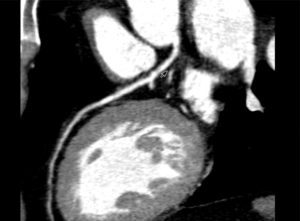 Cardiac computed tomography (CT) for Calcium Scoring uses special x-ray equipment to produce pictures of the coronary arteries to determine if they are blocked or narrowed by the buildup of plaque – an indicator for atherosclerosis or coronary artery disease (CAD). The information obtained can help evaluate whether you are at increased risk for heart attack.
Cardiac computed tomography (CT) for Calcium Scoring uses special x-ray equipment to produce pictures of the coronary arteries to determine if they are blocked or narrowed by the buildup of plaque – an indicator for atherosclerosis or coronary artery disease (CAD). The information obtained can help evaluate whether you are at increased risk for heart attack.
What is Cardiac CT for Calcium Scoring?
Computed tomography, more commonly known as a CT or CAT scan, is a diagnostic medical test that, like traditional x-rays, produces multiple images or pictures of the inside of the body.
CT images of internal organs, bones, soft tissue and blood vessels provide greater detail than traditional x-rays, particularly of soft tissues and blood vessels.
A cardiac CT scan for coronary calcium is a non-invasive way of obtaining information about the presence, location and extent of calcified plaque in the coronary arteries—the vessels that supply oxygen-containing blood to the heart muscle. Calcified plaque results when there is a build-up of fat and other substances under the inner layer of the artery. This material can calcify which signals the presence of atherosclerosis, a disease of the vessel wall, also called coronary artery disease (CAD). People with this disease have an increased risk for heart attacks. In addition, over time, progression of plaque buildup (CAD) can narrow the arteries or even close off blood flow to the heart. The result may be chest pain, sometimes called “angina,” or a heart attack.
Because calcium is a marker of CAD, the amount of calcium detected on a cardiac CT scan is a helpful prognostic tool. The findings on cardiac CT are expressed as a calcium score. Another name for this test is coronary artery calcium scoring.
What are some common uses of the procedure?
The goal of cardiac CT scan for calcium scoring is to determine if CAD is present and to what extent, even if there are no symptoms. It is a screening study that may be recommended by a physician for patients with risk factors for CAD but no clinical symptoms.
The major risk factors for CAD are:
• high blood cholesterol levels
• family history of heart attacks
• diabetes
• high blood pressure
• cigarette smoking
• overweight or obese
• physical inactivity
How should I prepare?
There is no special preparation is needed in advance of a cardiac CT examination. You should continue to take your usual medications but should avoid caffeine and smoking for four hours prior to your exam.
You should wear comfortable, loose-fitting clothing to your exam. You may be given a gown to wear during the procedure.
Metal objects, including jewelry, eyeglasses, dentures and hairpins, may affect the CT images and should be left at home or removed prior to your exam. You may also be asked to remove hearing aids and removable dental work. Women will be asked to remove bras containing metal underwire. You may be asked to remove any piercings, if possible.
Benefits
• Cardiac CT for calcium scoring is a convenient and noninvasive way of evaluating whether you may be at increased risk for a heart attack.
• The exam takes little time, causes no pain, and does not require injection of contrast material.
• An EBCT scan takes less than 20 minutes and you can return to normal activities immediately afterward.
• We use low dose radiation CT.
Discussing results with your doctor
Your doctor will discuss the results of the heart scan with you. Depending on the outcome, he or she may recommend:
• Continuing the current course of treatment
• Changing medications
• Changing your diet and exercise routine
• Setting new weight-loss goals
• Ordering additional tests
• Planning for follow-up appointments to monitor
your health and adherence to a treatment plan
RAVE Is offering this non-invasive study at all three of our locations for a cash price of $75.00 which includes the read. You owe it to yourself and your family to have this quick and painless procedure done to determine what your potential risk of coronary artery disease is. Patient must have a script from their physician in order to have the exam.
VENICE
512-516 S. Nokomis Ave
Venice, FL 34285
941-488-7781
Hours: 8:00am-5:00pm
ENGLEWOOD
900 Pine Street
Englewood, FL 34223
941-475-5471
Hours: 8:00am-5:00pm
SARASOTA
3501 Cattlemen Road
Sarasota, FL 34223
941-342-RAVE (7283)
Hours: 8:00am-5:00pm







